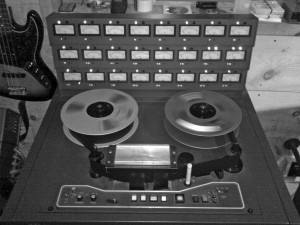“How many songs do you think we can record in X hours”? It’s the number one question we get asked by artists in pre-production meeting. We once recorded, overdubbed and mixed nine songs for a band in eight hours. We have also spent weeks working on only one song. That’s quite a range – so what’s the answer?
ESTABLISH GOALS
 The question I ask back is this: “What is your goal”? And of course I am usually met with blank stares. Obviously the goal is to record as many songs as possible, right? Unfortunately, that’s not usually a great goal for a recording project. and many artists seem to be of the mindset that a recording project is like going to an all-you-can-eat buffet: the more plates of food you bring back to your table the better (where plates of food = songs). There is nothing wrong with that, I suppose, but it’s usually not such a memorable meal (other than the indigestion). And that’s the problem with trying to squeeze too many songs into a recording session; usually you end up with a bunch of songs that could have been so much better.
The question I ask back is this: “What is your goal”? And of course I am usually met with blank stares. Obviously the goal is to record as many songs as possible, right? Unfortunately, that’s not usually a great goal for a recording project. and many artists seem to be of the mindset that a recording project is like going to an all-you-can-eat buffet: the more plates of food you bring back to your table the better (where plates of food = songs). There is nothing wrong with that, I suppose, but it’s usually not such a memorable meal (other than the indigestion). And that’s the problem with trying to squeeze too many songs into a recording session; usually you end up with a bunch of songs that could have been so much better.
A “goal” that many artists have is to record a demo for “getting gigs,” and they usually mention to us that they want to record five or six songs to show off their “range.” I guess they imagine that venue bookers will open the CD, put their feet up on their desk and listen to all these tracks for half an hour, before turning to their assistant and saying “Wow, listen to that range! We’d better book these guys!” I try to point out when I hear this strategy that it isn’t how it works. In reality, what they really want to know, even more than “How good are they?” is “How many drinking fans can they bring to our venue?” If a booker is listening for anything it is 1) what genre the artist is 2) how good the vocalist/front musician is and 3) how tight they are rhythmically.
Another frequent band “goal” is to record an EP to sell at shows. Not a bad idea, you say? There’s this pervasive theory that if an artist has an EP, they will be taken seriously. As a music publisher, I have to say, we pay attention to artists who have one amazing song. We don’t even remember artists who have six “okay” songs. It only takes one song to launch a music career, so why wouldn’t you focus all of your energy on that one song in the studio?
SESSION BREAKDOWNS
So here’s what a typical session looks like when a band wants to record six songs in two days: Day 1: Hour 1 – set up, miking instruments, getting levels and explaining how the individual headphone mixers work. Hours 2-7 – rhythm tracking (drums, bass, guitars, keys, scratch vocals), with usually two to four takes of each song until the band feels like they performed it tight. Time is then spent coming back into the Control Room to listen closely to good takes. Hour 8 – rough mixes that the artists can go home with to take notes. Day 2: Hours 1-4 – overdubs of lead vocals, backing vocals, solos, percussion and any necessary fixes to flubs. Hours 5-8 – final mixing of the six tracks.
So what’s wrong with this picture? Well for one thing, it’s hard to focus the attention of a band on the intricacies of six songs up to the standards necessary for capturing a recording that will last forever. Timing, energy, “do we switch to E-minor for one bar before the pre-chorus after the bridge?” – it can be hard to keep it all straight. Then there are the overdubs. The lead vocalist will usually record several takes of each song – that’s the equivalent of singing 12 to 24 full songs in four hours! Then after all the overdubs, that only leaves three hours to mix six songs (read: half hour for each song, max). That’s barely enough time to get a rough mix going, let alone start laying down meaningful automation and panning, dialing in the right compression and EQ and assigning fx for each track. By the time the band realizes that they’ve squeezed too many songs into too little studio time, they are out of time. Sure they can come back and keep mixing, but now instead of having great tracks to start with, they have so-so tracks laid down. Fixes take time; overdubs on less-than-perfect vocals take time.
Next time we tackle focusing on one song, and breaking up sessions into more manageable parts. [Editor’s note – read Part 2 in next month’s issue]
ABOUT THE AUTHORS
Zac Cataldo is a musician and owner/producer at Night Train Studios, a recording studio in Westford, MA. He is also co-owner of Black Cloud Productions, a music publishing company. Reach him at [email protected].
Brent Godin is a bassist/guitarist and engineer/producer at Night Train Studios. He is also a talent scout at Black Cloud Productions. Reach him at [email protected].
